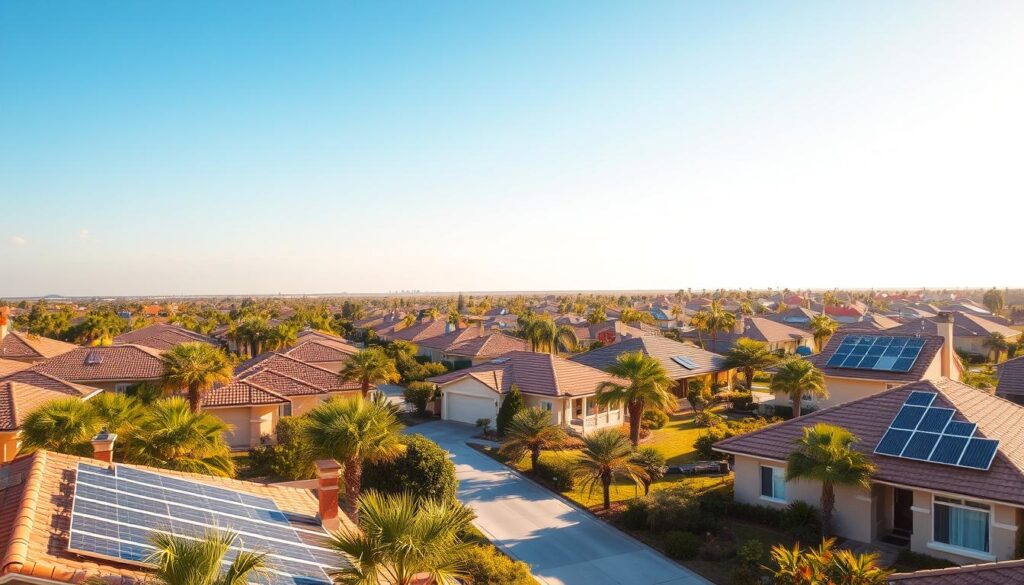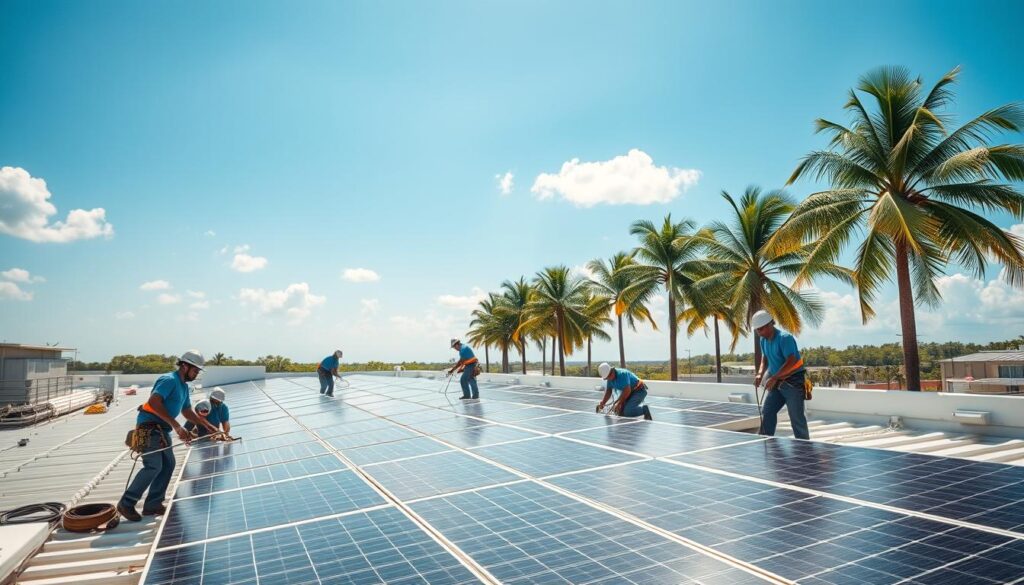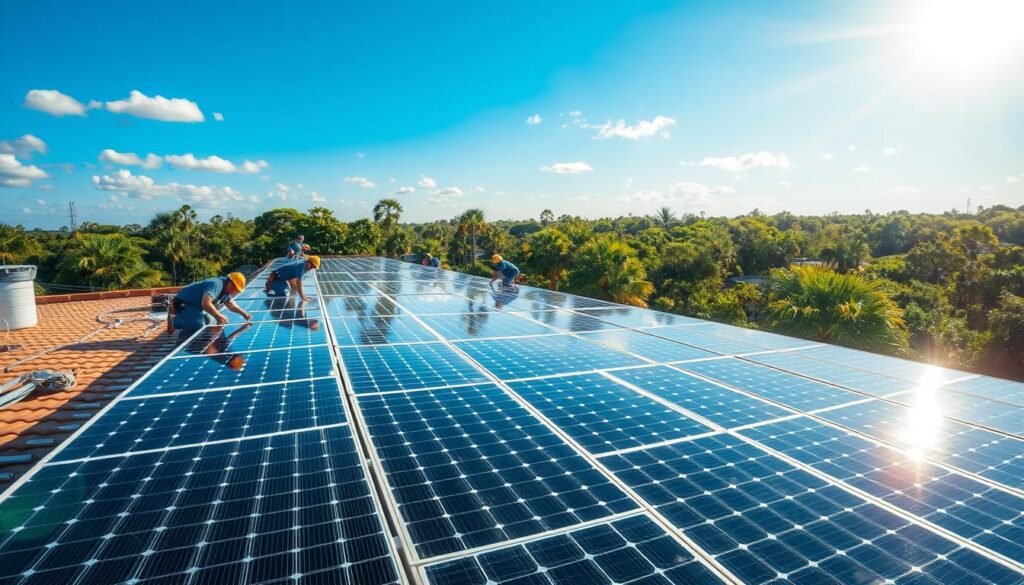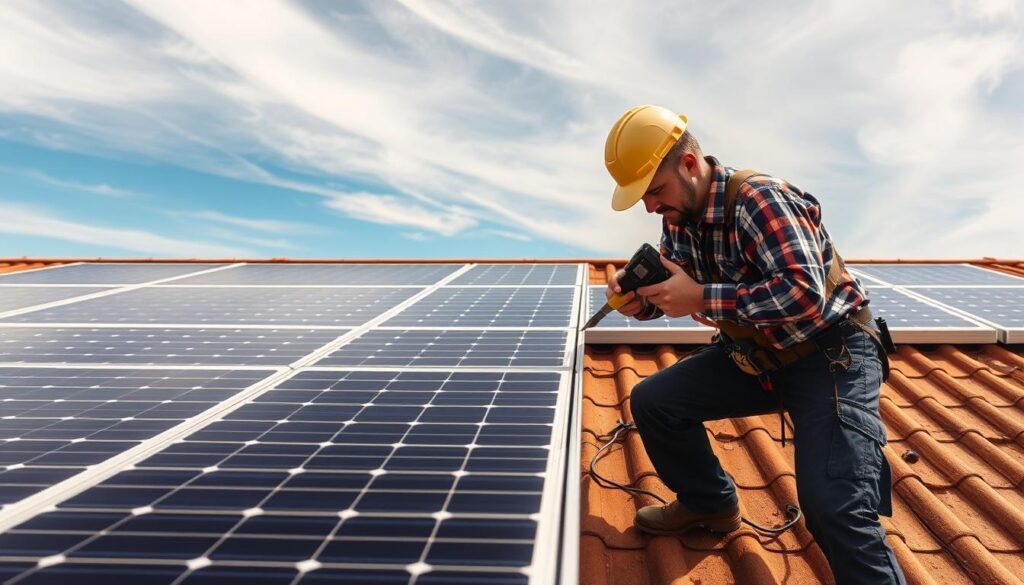Solar energy systems Florida are transforming how residents and businesses power their lives. With over 250 sunny days a year and 4.75 daily peak sun hours, the state ranks third nationally for solar potential. At SolPro, we’re dedicated to making solar power solutions accessible, blending sustainability with smart investments. This guide explores how solar technology aligns with Florida’s climate, policies, and economic goals.
Key Takeaways
- Florida homeowners qualify for a 26% federal tax credit on solar installations until 2022.
- A 7-kilowatt system could boost home resale value by $28,000–$42,000.
- Net metering lets residents store excess energy, reducing reliance on traditional grids.
- Solar power solutions in Florida save households up to $1,800 yearly on electricity bills.
- Florida’s solar industry supports job growth and cleaner energy production across the state.
Understanding Solar Energy Systems
Florida’s bright sunshine makes it a leader in solar energy systems florida. These systems turn sunlight into power, offering clean energy for homes and businesses. With over 200 sunny days yearly, the state ranks among the top for solar potential. Let’s explore how this technology works.
What is Solar Energy?
Solar energy is the power harnessed from sunlight. Renewable energy companies in Florida design systems that capture this energy using panels. Key facts:
- Produces no emissions or pollution
- Reduces dependence on fossil fuels
- Can lower monthly utility bills
How Do Solar Panels Work?
Here’s how sunlight becomes electricity:
- Light hits solar panels, activating electrons in silicon cells
- Direct current (DC) electricity flows to an inverter
- Inverter converts DC to alternating current (AC) for home use
- Excess energy feeds into the grid or stores in batteries
A typical system includes panels, inverters, and mounting hardware. For example:
| Component | Purpose |
|---|---|
| Solar panels | Capture sunlight |
| Inverter | Converts electricity type |
| Batteries | Store extra energy |
Florida’s systems often use 7-kilowatt setups, saving homeowners 20-30% on energy costs. Explore how these components work together to power homes sustainably.
Benefits of Solar Energy in Florida
Florida’s 237 sunny days a year make it a prime location for residential solar energy systems. Solar power solutions provide long-term savings, environmental benefits, and resilience against power outages. 
Cost Savings and Incentives
Switching to solar power solutions slashes electricity costs by up to 50%. Florida homeowners save an average of $1,500 annually, and federal tax credits reduce upfront costs by 30%. Over 25 years, systems pay for themselves with savings between $15,000 and $30,000. Net metering programs also reward excess energy production with credits, boosting financial gains.
Environmental Impact
Residential solar energy systems cut carbon emissions by 10 tons yearly—equivalent to removing two cars from roads. Florida’s 2050 clean energy goal relies on solar’s role in reducing fossil fuel dependence. By lowering carbon footprints, solar helps safeguard coastal ecosystems from climate threats like rising sea levels and storms.
Energy Independence
Solar systems reduce reliance on the grid by up to 80%, critical during hurricane seasons. With battery backups, homes stay powered during outages. Over 120,000 Florida homes already use solar, proving their reliability. Panels last 35–40 years, ensuring decades of clean, stable energy.
Choosing the Right Solar System for Your Home
Picking the best solar solution starts with understanding your energy habits and property details. Residential solar energy systems vary widely in cost and performance, so matching your needs to the right setup ensures long-term savings. Solar panel installation services can guide you through this process to maximize efficiency and reliability.
Types of Solar Panels
Florida’s climate plays a key role in panel selection. Coastal areas face salt-air corrosion, while inland homes may deal with heat. Below compares three main panel types:
| Type | Efficiency | Lifespan | Cost Range | Best For |
|---|---|---|---|---|
| Monocrystalline | 18-22% | 25+ years | $15,000–$30,000 | Shady roofs or limited space |
| Polycrystalline | 15-17% | 20-25 years | $15,000–$25,000 | Budget-conscious homeowners |
| Thin-Film | 10-13% | 10-20 years | Lower upfront cost | Temporary installations |
Battery Storage Options
Batteries ensure power during outages. Key options include:
- Tesla Powerwall: 14 kWh capacity, ideal for single-family homes
- Enphase Encharge: Modular design, scalable for varying energy needs
Florida’s frequent storms make battery storage a smart choice. During Hurricane Ian, 70% of homes with solar batteries maintained power for 24+ hours post-outage.
Calculate your system size using this formula: (Daily kWh usage ÷ daily sun hours) x 1.25 (efficiency factor). Example: A 633 kWh/month home in Orlando needs a 7kW system. Solar panel installation services can tailor this based on roof space and shading.
Pairing panels with the right battery storage creates a resilient energy plan. Ask installers about warranties and how systems integrate with PACE financing programs for no upfront costs.
Installers of Solar Energy Systems in Florida
Choosing the right best solar panel installers ensures your system meets Florida’s unique needs. The top solar energy companies in Florida must have certifications and experience handling local weather conditions like hurricanes and high humidity. Proper installation affects energy output and long-term savings.

Florida’s EnergySage Marketplace lists 35 solar companies, backed by 4,315 reviews and a 5.0 average rating. This highlights the state’s growing solar market.
Credentials to Look For
- NABCEP Certification: Required for technicians to ensure technical expertise.
- State Licensing: Florida mandates electrical and solar-specific licenses for legal operations.
- Insurance: Verify workers’ compensation and liability coverage to avoid financial risks.
- Manufacturer Partnerships: Trusted installers work with reputable panel brands for better warranties.
Top Local Installers
Research companies like Momentum Solar, Freedom Forever, and Tesla Solar. Compare quotes from at least three top solar energy companies in Florida. Local installers often undercut national brands by 10%, saving you money upfront. Check BBB ratings and completed projects to assess reliability. Look for companies offering 25-year warranties matching panel lifespan. Best solar panel installers provide detailed contracts outlining permits, installation timelines, and post-installation support. Avoid companies without documented experience in hurricane-resistant systems.
Solar Energy Incentives and Rebates in Florida
Florida’s solar energy incentives in Florida simplify the switch to clean energy. Residents and businesses save thousands through tax credits, rebates, and exemptions. These programs reduce upfront costs and long-term expenses, making solar accessible for homes and commercial solar solutions alike.
Federal Tax Credits
The federal Investment Tax Credit (ITC) cuts costs by 30% for both homes and businesses. A 5-kW system priced at $10,548 saves $3,164 instantly. Batteries like Tesla Powerwalls qualify too, lowering storage costs by up to 30%. This credit stays at 30% until 2032, then steps down gradually.
- Applies to solar panels and energy storage
- Available as a one-time tax credit
- Expires at 30% in 2032, then phases down
State-Specific Programs
Florida’s policies add to savings. Avoid 6% sales tax on solar purchases, and property taxes won’t rise due to installed panels. Net metering programs from FPL, Duke Energy, and TECO credit excess energy at full retail rates. Homeowners save $250 annually on property taxes alone.
- Sales tax exemption: $600+ saved on a $10k system
- Net metering credits kWh generated back to your account
- No added property taxes on solar system value
Commercial solar solutions gain the full 30% ITC plus state exemptions. Businesses save on sales tax and enjoy net metering, reducing utility bills while boosting ROI. Florida’s sunny climate and policies make solar a smart investment for all.
The Installation Process Explained
Going solar in Florida doesn’t have to be complicated. Reputable solar panel installation services handle every step, ensuring your solar energy systems florida are up and running smoothly. This guide breaks down the key phases of your solar journey from start to finish.

Initial Consultation
Every project begins with a site evaluation. Installers assess roof condition, shading patterns, and electrical capacity. Questions about your energy bills and usage goals help tailor the system to your needs. Expect to discuss details like roof pitch angles—optimal tilt angles vary from 18.4° (4/12 pitch) to 45° (12/12 pitch)—to maximize sunlight capture.
Installation Day Expectations
- Crews arrive early and secure work areas
- Panels and mounts are installed within 1-3 days
- Wiring connects to inverters and the grid
- Safety checks confirm system readiness
Noisy equipment runs during business hours, but most homes stay powered through temporary setups. Expect minimal downtime—most systems are ready for inspection within days.
Post-Installation Inspection
Local inspectors verify compliance with building codes. Utility companies then install bi-directional meters to track energy flow. Once approved, your system is activated via the Palmetto App. Warranties coverage starts immediately—panels often come with 20+ year guarantees, while inverters typically last 10 years. Monitor performance in real-time to ensure alignment with design specs.
Maintenance for Solar Energy Systems

Regular upkeep keeps solar energy systems florida running efficiently. Florida’s climate—pollen, salt air, and storms—demands proactive care to avoid costly repairs. Florida Power Services, a trusted provider, recommends checks every six months to maximize energy capture and longevity.
“Routine maintenance, cleaning, and adjustment of solar panel connections at least twice a year can prevent a drop in production and energy efficiency,” advises Florida Power Services.
Routine Maintenance Tips
- Inspect panels for debris after storms or heavy rain.
- Wipe dust and salt residue with a soft cloth—never abrasive materials.
- Verify connections are secure to avoid voltage drops or corrosion.
Troubleshooting Common Issues
Address these problems promptly:
- Production Drops: Use a multimeter to check panel output. Schedule a professional cleaning if dust buildup is evident.
- Inverter Errors: Reset the system or contact technicians for persistent alerts.
- Roof Leaks: Ensure mounts are flashed correctly—improper installation is a common cause.
| Parameter | Optimal Range | Recommended Action |
|---|---|---|
| Solar Irradiance | 200-1000 W/m² | Adjust panel angles seasonally |
| Panel Temperature | Below 105°F | Clear nearby obstructions |
| Voltage Readings | Within manufacturer specs | Call a technician for drops >5% |
Florida Power Services covers repairs within a 50-mile radius of Tampa, resolving most issues in under an hour. Their certified teams handle reinstallation with stainless hardware, extending system lifespan. Proper upkeep adds years to your solar power solutions, saving up to 8% in lost energy and reducing repair costs. Prioritize maintenance to protect your investment against Florida’s unique climate challenges.
The Future of Solar Energy in Florida
Florida’s solar energy sector is poised for explosive growth, driven by renewable energy companies in Florida and innovative solar energy systems florida. Emerging technologies and supportive policies are reshaping how homes and businesses harness sunlight, creating a brighter, cleaner energy future.
Technological Advancements
Advances in solar energy systems florida are making panels more efficient. New bifacial panels capture sunlight from both sides, while smart inverters optimize energy flow. Battery tech like Tesla Powerwall and SunPower solutions now store excess power for cloudy days. Companies like Ambia are leading installations of these systems, ensuring homes stay powered even during outages.
Projected Growth in the Industry
Florida added 3 gigawatts of utility-scale solar in 2024, ranking second nationally. By 2030, the state aims to double its solar capacity, backed by federal tax credits cutting costs by 30%. A 2022 survey shows 84% of voters support net metering, fueling residential adoption. Renewable energy companies in Florida anticipate 10,000 new jobs by 2025 as demand rises.
- Small solar farms under 75MW bypass strict permitting rules, accelerating deployment.
- Community solar projects will expand access to renters and apartment dwellers.
- Florida Power & Light’s 2024 expansion plans include 12 new solar + storage sites.
While challenges like land-use debates linger, the path forward remains sunny. With policies protecting net metering and tech costs dropping, solar energy systems florida are becoming a must-have for energy independence.
Solar Energy Systems for Businesses
Businesses in Florida can cut costs and boost sustainability with commercial solar solutions. From warehouses to hotels, tailored systems are designed to match energy demands and space. Let’s explore how top solar energy companies in Florida deliver scalable options for every industry.
Commercial installations often use larger arrays or innovative setups like parking lot canopies. Many companies partner with providers offering flexible financing, such as Power Purchase Agreements (PPAs) or grants. Here’s how it works:
- Roof-mounted systems for office buildings
- Ground-mounted arrays for manufacturing sites
- Parking canopy solutions for retail complexes
Case Studies in Action
The Surf & Sand Hotel in Florida partnered with SunFarm Energy to install a 235 MWh system. This array now supplies half their energy, saving $48,000 annually. Another success: Adaptive Ready Rent secured a 50% grant through USDA REAP for their 36.86 kW system, cutting costs upfront.
Why Businesses Choose Solar
Switching to solar means:
- 20-50% lower utility bills
- 30% federal tax credit eligibility
- ROI of 10-30% over 20 years
Top solar companies also offer 30-year warranties on installations up to 2 MW. For instance, Helping Hand Missions reduced their energy use by 90% with a 96 kW system. These systems also qualify for PACE financing, letting businesses pay via property taxes without upfront costs.
“Solar isn’t just eco-friendly—it’s a smart financial move,” says a solar analyst at Florida’s Energy Bureau.
Frequently Asked Questions About Solar Energy
Still have questions about solar power solutions? Explore answers to common concerns and steps to begin your journey toward clean energy.
Common Concerns Answered
Florida’s solar panels are built to withstand hurricanes, with many rated for 110+ mph winds. Even in extreme heat, systems like those in Orlando maintain efficiency. Net metering programs like OUC’s credit excess energy produced, but always confirm eligibility. Florida law protects homeowners from HOA restrictions blocking solar installations. Panels last 25+ years, and metal roofs can support systems longer than standard shingles. Solar’s environmental impact reduces carbon emissions while cutting monthly bills.
How to Get Started with Solar Energy
Begin by researching the best solar panel installers in your area. Request quotes from certified professionals, comparing warranties and incentives. Use the federal 26% tax credit and state programs to offset costs. Calculate your home’s needs: a 1,500 sq ft house typically requires 8–11 kW. Installers will handle permits like Orange County’s electrical requirements. Systems sized to match annual consumption (e.g., 13.3 kW for 18,000 kWh/year) achieve net-zero goals. Budget $3–$6 per watt, and ensure a bi-directional meter is installed for net metering.
